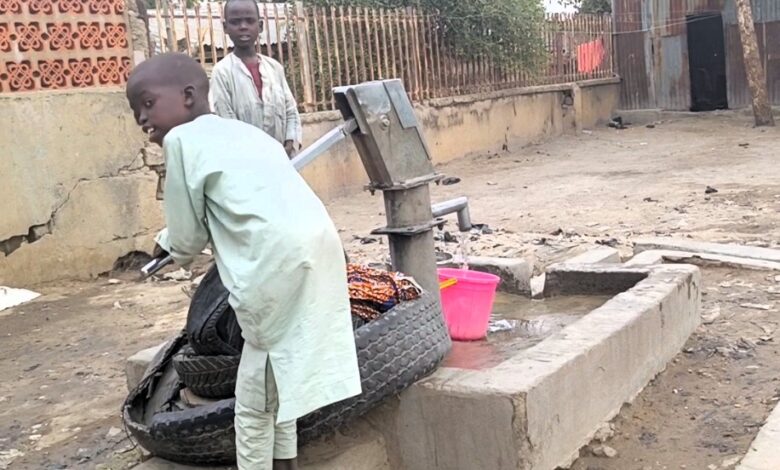By Grace Donatus
In recent weeks, Maiduguri has witnessed a flood disaster that has left countless residents without access to clean, safe drinking water.
As floodwaters washed over homes, streets, and public spaces, they disrupted our daily lives and created an escalating health crisis.
Access to clean water, a fundamental human right, has become scarce, leaving families vulnerable to disease and dehydration.
Yet, amid this pressing emergency, the media—the very institution that should amplify our voices and plight—remains disturbingly silent.
Floods often leave a trail of devastation that goes beyond physical damage, impacting essential resources like clean water.
In Maiduguri, this reality has set in with full force. Clean water supplies are compromised as rivers, wells, and reservoirs are contaminated with pollutants and debris, turning our drinking sources into potential hazards.
Despite this ongoing crisis, media outlets have not given this issue the attention it deserves, raising serious concerns about who will voice our needs and push for effective government intervention.
For many of us, the scarcity of clean water has brought our lives to a standstill.
In affected neighborhoods, long lines have formed at the few remaining functional water points.
These resources are rapidly depleting, leaving people scrambling to find alternative sources.
The urgency to restore clean water supply cannot be overstated, as residents are forced to make impossible choices between consuming unsafe water or facing dehydration.
However, the lack of coverage by the media contributes to the perception that this issue is not a priority.
Media institutions play a critical role in modern societies, especially during times of crisis.
They are our eyes, ears, and voices, bringing issues to light and holding authorities accountable.
In a situation like Maiduguri’s, media engagement could trigger immediate response from both governmental and non-governmental bodies, sparking an urgent call for clean water resources.
Yet, with minimal to no coverage, there is little pressure on policymakers to act swiftly, leaving Maiduguri residents to fend for themselves amid worsening conditions.
Our health is now at stake. Contaminated water leads to outbreaks of waterborne diseases, a risk already heightened by the flood. Cholera, dysentery, and other serious infections thrive in environments where water sources are unprotected and unmonitored.
Without swift action to restore clean water, the coming weeks could see a spike in such cases, overwhelming healthcare facilities and threatening lives—especially among children, the elderly, and vulnerable populations.
The silence from the media raises troubling questions. Why is the suffering of Maiduguri residents not making headlines? Have flood disasters become so common that they no longer stir public concern? Or is it a lack of awareness among journalists of the depth and seriousness of our water crisis? The answers are uncertain, but the impact of this silence is real, leaving an entire community feeling unheard, unimportant, and, ultimately, abandoned.
This lack of coverage is more than just an oversight; it reflects a concerning gap in the media’s responsibility.
As citizens, we rely on journalists to shine a light on our struggles, particularly in situations where our voices are muted by circumstances beyond our control.
When that light dims, it becomes easy for our issues to slip through the cracks, creating space for neglect and inaction.
This absence of coverage allows the situation to worsen, contributing to an environment of isolation for flood-affected residents.It is crucial that the media takes up its role as a bridge between the public and decision-makers.
In Maiduguri, every report on the water crisis could be the impetus for change, drawing attention to the thousands of people struggling for basic human necessities.
Television networks, radio stations, newspapers, and online platforms need to document the experiences of residents, the ongoing efforts to obtain clean water, and the urgent needs that remain unmet. Doing so could compel relevant authorities to prioritize aid and mobilize resources effectively.
The government’s role in addressing the Maiduguri water crisis is indispensable, but swift action often hinges on visibility and public pressure. If the media were to expose the true extent of this crisis, it could potentially galvanize governmental response, leading to the allocation of funds, deployment of relief efforts, and creation of sustainable solutions to prevent future water shortages post-disasters.
Without the media’s spotlight, however, this crucial pressure remains absent, and our government may not recognize the depth of the problem.Access to clean water is not a luxury; it is a necessity.
The flooding has already taken away so much from the people of Maiduguri. If immediate action is not taken, the absence of clean water could soon take lives, adding an even graver human toll to the disaster.
By failing to cover this story, the media indirectly contributes to the deterioration of living conditions for residents who are already in desperate need of help.It is time for Maiduguri’s water crisis to be brought into the national conversation. Our story should not be one that fades quietly but rather one that inspires collective action and compassion.
Media houses must remember that they are the lifeline between the silent struggles of the populace and those in positions of authority who can enact change.
By amplifying our voices, the media has the power to transform our reality from one of hardship to one of hope and recovery.Our appeal is simple: do not let Maiduguri’s water crisis go unreported. Stand with us by telling our story, by calling for accountability, and by ensuring that clean water flows freely to those who need it most.
The media can turn the tide in our favor, but only if they choose to do so.In this crucial moment, we ask for nothing less than their unwavering commitment to informing the world of our plight. Our lives, and our future, depend on it.
Grace Donatus, a 300 level student from Mass Communication Department Borno State University, writes from Maiduguri Borno State.












